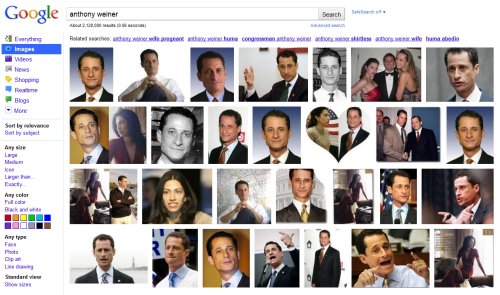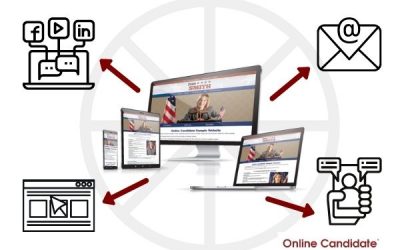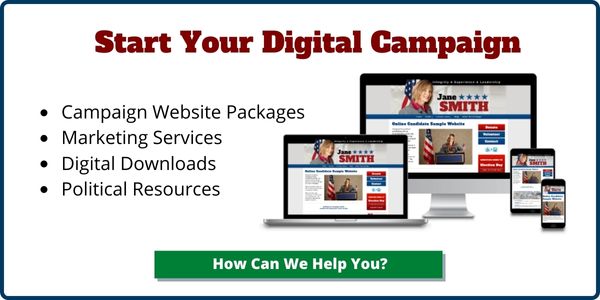What The Weiner Scandal Can Teach Us About Online Reputation
Many political candidates only start thinking about how they are portrayed online after they begin their run for office. What many fail to realize is that you (or others that share your name) already exist online. When voters type in your name into Google, what do they see?
And what will they see in search results during the run-up to Election Day? And what do you think people will see after a major scandal has rocked your political campaign?
 At the time of this writing, a controversy involving Anthony Weiner, a U.S. Representative for New York’s 9th congressional district, has entered it’s second week. We won’t rehash the issue here, but we are using his situation as an example of what can happen to someone’s search results following a political scandal.
At the time of this writing, a controversy involving Anthony Weiner, a U.S. Representative for New York’s 9th congressional district, has entered it’s second week. We won’t rehash the issue here, but we are using his situation as an example of what can happen to someone’s search results following a political scandal.
As we take a look at search results for the name ‘Anthony Weiner’, keep in mind he has a long political career behind him and during that time has been featured in the media quite often. Also, keep in mind that adding any other terms to this search would have provided very different results. For this example, we’re just sticking with his name.
The pink areas represent areas in the first page Google results that would be considered ‘negative’.
Okay, let’s break this down.
The News results appear on top of the general search results. There isn’t much anyone can do to control that. That section is comprised of larger news sources. If you are in a smaller campaign with less coverage, it’s possible that there would not even a News block.
Next is Wikipedia. This article is already updated with the latest on the scandal. Wikipedia is edited by others. There isn’t much a candidate can do about their listing. If a candidate or a staffer tries to repeatedly edit an article, that can lead to more trouble.
The next few listings are neutral/positive or are controlled by Weiner. There are two videos, two websites and a Twitter account listing controlled by Weiner. If he updates the two sites or the Twitter account, it’s possible they may move up a notch. The only reason those listings are still in the top ten are because the items have been around for a while and probably have a large number of links to them.
Rounding out the top ten is a TMZ post, a Buzzfeed page and a Politico article. TMZ and Politico are authoritative websites whose articles tend to rank well, so no surprise there. I suspect the Buzzfeed page might have helped break the scandal and built up a large number of backlinks early on. Otherwise, I don’t know why it’s in there over another similar page.
Finally, there are the related searches. Most of them are actually related to his legislative record. If he did not have that record, there’s a good chance the related search topics would be quite different.
Managing Disaster
All in all, it could have been much worse for Weiner. His online history helped prevent a complete meltdown of his search results. Even an image search on his name was not as bad as it could have been.
And that was with SafeSeach OFF!
As of this writing, it does not look like Rep. Weiner has done much to combat this negative material. Press releases or even acknowledgement of the scandal on his websites would probably have ranked well. Additional material, potentially controlled by Weiner, could have presented a more flattering view of the situation or at least help present his side of the controversy.
The Takeaway
Your online political campaign begins today. Building your online reputation takes time and some effort. This can mean creating personal LinkedIn and Naymes profiles, building a network of future supporters on Facebook and even starting a political website. Linking those online entities to each other helps build relevance for name searches.
During a campaign, you can be sure that unflattering things about you will appear online. It can come from your opponent’s campaign website, a newspaper article, a local blogger or even a negative comment on a discussion board. Your goal as a candidate to keep that material from appearing or pushing it down as best you can when voters search for you. To do that requires monitoring and proactively putting out your own content.
Considering Rep. Weiner’s problems, he’s pretty lucky to still have the search results he has for his own name. Without addressing the problem, it’s hard to say what his search results will be a few months from now.
Running For Office as an Online Candidate explores strategies in developing and promoting your campaign online. Download a sample or get the full version today.
Watch Out For These Domain Name Scams
If you have a registered political domain name, most registrars will email you instructions on how to renew your registration. If you get a letter in the mail, well, check it carefully. This information applies to both business and personal domains, not just political names.
If you have a domain name or two, it’s a good idea to check your registrar account occasionally and make sure your domain contact information is up to date. You can also check the status of any domain name through a WHOIS search service on your registrar’s site or through sites such as lookup.icann.org. Just type the domain name in the search box, and you will see when the name is set to expire, along with other information.
Letting a domain name expire means that your campaign website and domain e-mail accounts will stop working, as the domain name will no longer point to the server where your website resides. When a domain expires, there is generally a 30 day Redemption Period to renew. To renew during this time, the owner may be required to pay additional fees, depending on the registrar. After the Redemption Period ends, the name goes into a Pending Delete status. After a few days, the domain will be deleted from the registry. After the deletion, anyone can register the name and become the new legal owner.
[bctt tweet=”Letting a domain name expire means that your campaign website and domain e-mail accounts will stop working.” username=”onlinecandidate”]
If you renew early, the additional renewal period simply pushes your expiration date further out from the initial expiration date.
Getting back to renewal notices by mail—if you get any, beware. If you receive a notice of renewal that is not from your original registrar company, ignore it. Some unscrupulous companies do the phone company equivalent of “slamming.” The scam is to have you renew your domain with the new company at a much higher price than you were spending with your original registrar.
Keep a record of your domain information, and to be safe, mark your calendar for renewal at least a month ahead of time.
For Online Candidate political campaign website orders, we register your domain name for you in your name, and we notify you when your domain name is about to expire. Even if you do not keep your site after your election, you can still renew your domain name registration.
What Are The Goals Of Your Online Campaign?
 As a political candidate, what is your purpose for putting your political campaign online? Is it to get the most number of ‘Likes’ to your Facebook page? Is it to get a larger number of Twitter followers than you opponent? Is it to get your campaign ad video on YouTube to go viral? Is it to get the most number of visitors to your campaign website?
As a political candidate, what is your purpose for putting your political campaign online? Is it to get the most number of ‘Likes’ to your Facebook page? Is it to get a larger number of Twitter followers than you opponent? Is it to get your campaign ad video on YouTube to go viral? Is it to get the most number of visitors to your campaign website?
If those are your goals for promoting your campaign online, then you are missing the point. A political campaign is a series of actions taken over a long period of time to achieve an end goal. The goal – the only goal – for political marketing is to get elected into office.
The ways you connect with voters is simply a matter of reaching them where they exist. People watch television and listen to the radio, so candidates run commercials on them. People search for election information online, so a campaign website is a vehicle to provide that information. People use social media to communicate and share, so candidates should have a presence there, as well.
The difference between traditional commercials and digital campaigning is that digital offers two-way communication rather than one-way message broadcasting. Social media is all about getting voters to know, like and trust you. If people are interested in you and your campaign, they will keep up with the campaign through whatever channels work best for them. It may be through newspapers, watching TV ads and local news, through the web, or a combination of these channels.
It doesn’t matter if you have 50 or 50,000 social media followers. Don’t let those numbers distract you or get you thinking that online success alone will win your election.
In the end, your goal is to get real people into a real voting booth. Everything else is just a numbers game.
Our goal is to help YOU get voters where they need to go! Keep up with our news and tips through Facebook, Twitter or sign up for our email list below.
The Online Hub of Your Political Campaign
With the rise of social media, the role of the campaign website has shifted somewhat from being the bulk of a candidate‘s online presence to more of an informational hub. Even so, a website is still critical as both an online platform and a place to reference in your political advertising.
While a campaign website contains the core message and branding, people can still follow candidates and campaigns through a variety of methods, from social media to email to texting. Here are a few reasons why all political candidates should have a campaign website.
Social media is gated
Running your online presence from Facebook is possible, but it’s only fully interactive for Facebook members. Not everyone is on Facebook, and not everyone wants to join. Putting up digital barriers only excludes voters and potential supporters.
It’s weird without a domain name
You can technically point a domain name to anywhere on the web. It does not need to point to a website root; a domain name can resolve to a specific web page anywhere. Either way, a real, qualified domain name is professional. Who do you think has a better campaign? SmithForCongress.com or freewebsite.com/smith-for-congress? Which URL fits better on a political brochure?
Your opponent has a website
Candidates of all levels turn to the web to reach voters and build support. Even positions such as county coroners and clerks are building a web presence to help win votes. Voters rely on the web for election information and to learn candidate positions on the issues. If you are not where the voters are, how will you gain their support?
It’s a search result you can control
Go ahead, search for yourself in Google. What comes up? Is it something good? Something bad? A mix of results? A website tailored to your campaign will quickly rise to the top of the search results when voters search for your name. And if you control that result, then you control the message that people see when they click through.
It’s an actual hub
Between Facebook, Twitter, YouTube, and all the options that being online offers, having a central location to promote the different elements of your campaign comes in handy. Cross-promote your delivery methods to strengthen your overall web presence.
Voters expect a website
Come on, it’s the third decade of the 21st century! It’s not that hard to get started. You wouldn’t campaign without printed materials, would you?
Candidates ignore the web at their own peril. People will be talking about you on the web, whether you are there or not.
X / Twitter Tweet Post Ideas for Political Candidates
Creating and using an X (formerly Twitter) account is simple enough, but sometimes it can be tough coming up with items to post (or formerly tweet) about. Here is a quick list, in no particular order, of post ideas for candidates and political campaigns.
- Candidate thought or comment of the day.
- A news article related to a major campaign issue.
- (Not so flattering) news about your opponents.
- Ask followers to stay current with your campaign by signing up for your email list.
- Reminder about event.
- Tweet during the event.
- Followup about the event.
- Latest poll numbers about you.
- Latest poll numbers about your opponent.
- Ask what issues are important to your followers.
- One sentence summary of your latest blog post, with link.
- News article mention.
- News about your location/district, with comment.
- Blog posts on other sites about you or your campaign.
- Support requests, usually related to another event.
- Volunteer requests, usually tied to a specific event or activity.
- Updates about campaign staff that may be of general interest.
- Fundraising goal status.
- Notification of new billboard/large banner location.
- Announcement that signs are available.
- Link to new video or campaign ad.
- Link to brochure or position paper file on your campaign website.
- Latest endorsement announcement.
- Thank you to helpful person/organization.
- Open questions to followers (be ready for the replies!)
Don’t forget to keep an eye out on your follower list to share and re-post relevant content from others. Keep your updates varied and frequent.
You can easily post 7-10 times a day without annoying your followers. Because X / Twitter acts like an ongoing stream, not everyone is going to see your first post. You can republish content and share links multiple times without being annoying.
Online Candidate websites allow you to easily add links to your social media profiles. You can even add custom code, such as sidebar widgets, to attract even more followers.
The Power To Hold Your Campaign Hostage
 We recently heard a story of a small campaign that ran into some serious web problems. First, they spent a lot of money on setting up a campaign website. After paying north of $4000 for the website – they then had to shell out an additional $90/hour for updates. On top of that, they had problems getting in touch with the designer or actually getting the changes they wanted done in a reasonable time frame.
We recently heard a story of a small campaign that ran into some serious web problems. First, they spent a lot of money on setting up a campaign website. After paying north of $4000 for the website – they then had to shell out an additional $90/hour for updates. On top of that, they had problems getting in touch with the designer or actually getting the changes they wanted done in a reasonable time frame.
We call that a digital hostage situation. And for a political campaign with limited finances, it’s a dangerous position to be in.
It doesn’t have to be that way.
Most websites today are built with a content management system (CMS). This allows non-technical users the ability to add, edit and delete content and pages. However, most content management systems — including the popular Wordpress — may not be easy to use for inexperienced users. CMS systems like Joomla or Drupal can be even more difficult to use. Add plugins and customizations, and many people won’t know the first thing to do to update a site. One wrong click, and who knows what could happen!
Even our own system, Online Candidate, has become more complicated as we’ve added additional features and functionality. Our goal from the start has been to keep the system as focused and intuitive as possible, but we’ve found that our help system has expanded along with the feature set. The bottom line is that there’s a learning curve involved with any content management system.
Here are other advantages for campaigns using a CMS on their website:
Costs. Many web designers will charge a 15 minute minimum to make updates. More active campaigns may update their websites daily or even several times in a day for a fast-breaking topic. Those charges will add up fast. Better to have a volunteer make the edits.
Speed. Another problem with relying on an outsider to update the campaign website is that of timeliness. Speed of response is critical for a political campaign. There’s no guarantee your web designer is going to be able to update your campaign website quick enough. A 24 or 48 hour turnaround time isn’t going to cut it.
Control. You wouldn’t send out a campaign brochure with misspellings or typos. Would you rely on an outsider to get everything right on your campaign website? And if there is a problem with an update, how long will it take to correct the issue?
Even if the candidate or campaign manager does not actually do the updates, at least one person in the campaign should have access to the website and the ability to make a certain amount changes or additions.
If a web designer or developer won’t allow you the ability to update your own content, it should immediately raise a red flag. No matter who designs your website, you should know how the website can be updated before it is created. The last thing you want is to have your web presence compromised… or held hostage.
Online Candidate doesn’t take hostages! You are free to add, edit and delete your content whenever and from wherever you choose.









